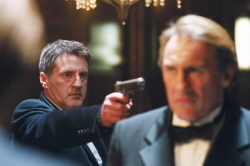Mark:
That 36 Quai des Orfèvres is loosely based on real-life events in 1985 in France provides a sobering counterpoint to my suspicions that much of this film was false. False in its set-up of the dual between Auteil and Depardieu; false in its treatment of the subsidiary characters, in particular Eddy Valence. That some of what we see is grounded in reality is much more disturbing.
 The Criminal Investigations Division of the French Police – their Scotland Yard – is located at the eponymous address, and played host to a story of inhouse politics and corruption of significant scale in the late 80s. Writer and Director Olivier Marchal is a former French policeman himself, and was friends with some of the figures depicted, and thus seems well-placed to relate the truth of the matter, even if he has changed details to make the story more cinema-worthy. When the Commissioner is moving on to a greater position, there are two equally matched candidates to replace him – Léo Vrinks (Daniel Auteil), the much-loved head of the Anti-Crime Unit, but with a blurry line between his own behaviour and that of his informants, and Denis Klein (Gérard Depardieu), head of the Search and Action Squad, a man consumed by his failure in life, and desperate for political power as a means to validate himself. When both teams attend a stake-out, one causes tragedy and the remainder of the film becomes a battle to control the ‘spin’ of events.
The Criminal Investigations Division of the French Police – their Scotland Yard – is located at the eponymous address, and played host to a story of inhouse politics and corruption of significant scale in the late 80s. Writer and Director Olivier Marchal is a former French policeman himself, and was friends with some of the figures depicted, and thus seems well-placed to relate the truth of the matter, even if he has changed details to make the story more cinema-worthy. When the Commissioner is moving on to a greater position, there are two equally matched candidates to replace him – Léo Vrinks (Daniel Auteil), the much-loved head of the Anti-Crime Unit, but with a blurry line between his own behaviour and that of his informants, and Denis Klein (Gérard Depardieu), head of the Search and Action Squad, a man consumed by his failure in life, and desperate for political power as a means to validate himself. When both teams attend a stake-out, one causes tragedy and the remainder of the film becomes a battle to control the ‘spin’ of events.
Auteil is excellent as the unfortunate Vrinks, with his expressive face and commanding presence, and although some of his scenes have their power diminished by some odd choices by Marchal – the non-linear format in this case reduces the impact of Vrink’s fall – he really steals the show. Depardieu has been widely praised for his performance in 36 Quai des Orfèvres, however I found him a little too quiet, and not quite menacing enough. Perhaps he was just tired – after all, he made nine films in 2004, and recently announced his coming retirement – but what some may see as powerful, I only found a bit dull.
The problems really lie in the falseness of the ‘dual’. That there could be two equally matched candidates for any job, especially those who have been working for many years, seems trite. Auteil and Depardieu are certainly well-matched in terms of skill and presence, but I never quite accepted the dual as important, and wished it wasn’t distracting me from the tragedies that unfold around them.
The final scenes are well-handled, although there is also an element of falseness with the subplot around Titi Brasseur. Why Marchal thinks the audience will be unaware of his intentions is a mystery, as the only possible outcome for the characters he has described is what occurs, and one can see it coming a mile away.
Whilst it has style to burn, 36 Quai des Orfèvres is essentially a character piece about two men, and unfortunately it is lacking. Atmospheric and moody, it does entertain, but sadly misses making the political and social point it seems to have been wanting to make.
Rating: